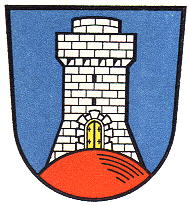Büdingen (kreis): Difference between revisions
Jump to navigation
Jump to search
Knorrepoes (talk | contribs) m (Text replace - "|width="15%"|50 px|right |} " to "|width="15%"|50 px|right |}<seo title="Wappen, Gemeindewappen" /> ") |
Knorrepoes (talk | contribs) m (Text replace - "[[Literature" to "{{media}} [[Literature") |
||
| Line 17: | Line 17: | ||
The mountain in the base of the arms symbolises the Vogelsberg area, the highest point in the district. The tower is the former tower on the Vogelsberg. The tower also symbolises the city of [[Büdingen]], as the oldest seals of the city also showed a tower. | The mountain in the base of the arms symbolises the Vogelsberg area, the highest point in the district. The tower is the former tower on the Vogelsberg. The tower also symbolises the city of [[Büdingen]], as the oldest seals of the city also showed a tower. | ||
{{media}} | |||
[[Literature]] : Stadler, K. : Deutsche Wappen - Bundesrepublik Deutschland. Angelsachsen Verlag, 1964-1971, 8 volumes. | [[Literature]] : Stadler, K. : Deutsche Wappen - Bundesrepublik Deutschland. Angelsachsen Verlag, 1964-1971, 8 volumes. | ||
Revision as of 19:41, 8 July 2014
| Heraldry of the World Civic heraldry of Germany - Deutsche Wappen (Gemeindewappen/Kreiswappen) |
BÜDINGEN (BÜD)
State : Hessen
Additions : 1936 Schotten (partly)
Incorporated into : 1972 Wetteraukreis
Origin/meaning
The arms were granted on June 16, 1952.
The mountain in the base of the arms symbolises the Vogelsberg area, the highest point in the district. The tower is the former tower on the Vogelsberg. The tower also symbolises the city of Büdingen, as the oldest seals of the city also showed a tower.
Contact and Support
Partners:
Your logo here ?
Contact us
© since 1995, Heraldry of the World, Ralf Hartemink 
Index of the site
Literature : Stadler, K. : Deutsche Wappen - Bundesrepublik Deutschland. Angelsachsen Verlag, 1964-1971, 8 volumes.











